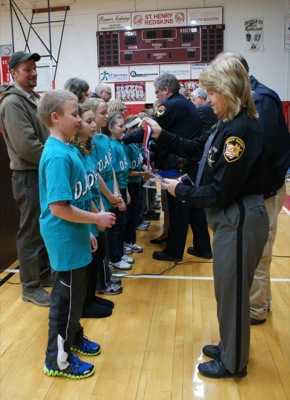Thursday, February 9th, 2012
DARE - a good choice for students
Local leaders dispute claims program doesn't work
By Shelley Grieshop

Photo by Shelley Grieshop/The Daily Standard
Eleven St. Henry Middle School fifth-graders receive medals for being selected honor students during a DARE graduation ceremony on Wednesday. In front at right is DARE officer Mercer County Sheriff's Deputy Sue Miller.
ST. HENRY - "If you want to live as long as you can, don't do drugs."
Morgan Bruggeman's words were clear and convincing as she stood in the St. Henry Middle School gymnasium on Wednesday, addressing her classmates and others during a Drug Abuse Resistance Education (DARE) graduation ceremony.
But will the fifth-grader remember the advice a few years from now if urged to try illegal drugs, alcohol or cigarettes?
The success of the national DARE program has in recent years been scrutinized by officials with the Ohio Department of Education and the U.S. Surgeon General's Office. Several top agencies continue to classify DARE as "ineffective."
But locally, schools, parents and students themselves - even years after graduating from high school - continue to praise its worth. Dennis Wendel, a teacher at St. Henry schools and a speaker each year at the DARE graduation, is living proof of its success.
"I never used drugs or smoked a cigarette, and I didn't drink alcohol until after I turned 21. ... People say that can't happen in Mercer County. Baloney. I did it," he told the students on Wednesday.
Wendel graduated from the DARE program during a similar ceremony more than two decades ago, he said.
"Twenty-one years ago I sat in the same seats as you guys, and 21 years later I'm still committed. I've kept my promise," he said.
Students in the local program complete workbook assignments, do role playing and write essays on what they've learned. Their final step is making a promise to make good choices throughout their life.
DARE is an international program created in 1983 in Los Angeles, Calif. Its goals are to provide students with the necessary skills to recognize and resist pressures to experiment with drugs, alcohol and tobacco, and avoid gangs and violence.
The program is offered locally in all Grand Lake area school districts.
In Mercer County, the DARE program is spearheaded by deputies Sue Miller and Mark Germann of the sheriff's office. Miller is passionate about her work and believes DARE helps combat the harmful choices children face every day.
"I think today's kids are bombarded with negative messages," she said.
DARE offers youngsters solid information to help them live healthier and safer lives, and stand up for themselves without buckling under pressure, she said.
"It's important we get the facts out to the kids," she said. "Sometimes the misinformation they have is dangerous."
The Mercer County DARE Boosters recently received an encouraging letter from a former student, Tony Lefeld, who graduated from St. Henry High School in 2010.
"I would like to inform you that I have kept to my DARE promise to remain drug- and alcohol-free," wrote the University of Notre Dame student. "I have tried to be a good role model toward my fellow students by showing that a non-drinker can still be a fun guy."
Lefeld, who as a senior was awarded a DARE scholarship, said he tries to persuade others to "at least drink less" and feels his efforts have yielded good results.
Bobby D. Stroop, president of the DARE Association of Ohio, said those who say DARE doesn't work have not done their homework.
"As a DARE instructor, being in the classroom with the children and seeing their reaction, I say it does," he said, adding recent studies by the National Registry of Evidence-based Programs and Practices support his claim.
He recalled a quiet girl in one of his classes who initially refused to shake his hand during the graduation ceremony.
"I wondered what I was going to do, then she reached out with both arms and hugged me in front of all the parents," he said.
Later he learned from the girls' mother that her father had died from a drug overdose. After being through the program, the youngster finally was able to talk about the experience, Stroop said. The mother told him she was grateful for the program.
"So does DARE work? I say yes, in ways that other organizations cannot understand," he said.
